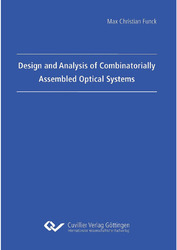| Areas | |
|---|---|
| Serie de libros (97) |
1381
|
| Nachhaltigkeit |
3
|
| Gesundheitswesen |
1
|
| Letra |
2369
|
| Ciencias Naturales |
5408
|
| Ciencias Ingeniería |
1795
|
| Ingeniería | 292 |
| Ingeniería mecánica y de proceso | 862 |
| Ingeniería eléctrica | 688 |
| Mineria y metalurgía | 30 |
| Arquitectura e ingeniería civil | 75 |
| General |
98
|
|
Leitlinien Unfallchirurgie
5. Auflage bestellen |
|
Erweiterte Suche
Design and Analysis of Combinatorially Assembled Optical Systems (Tienda española)
Max Christian Funck (Autor)Previo
Indice, Datei (29 KB)
Lectura de prueba, Datei (92 KB)
Producing high quality optical systems at reasonable cost is a challenge and
solutions enabling cost-efficient production in small to medium quantities need
to be developed in order for Germany to stay competitive on the global market.
Both, performance and cost are largely influenced by manufacturing and
assembly tolerances and frequently compensation such as alignment is required
to achieve the demanded performance.
This dissertation systematically develops combinatorial assembly as a
compensation strategy which does not require iterations and as such is suitable
for automated production of small series. A pool of components and
subassemblies, necessary for the assembly of a series of systems, is
characterized prior to the assembly and measurement results are stored in a
database. Then, optimal component combinations are found during a modelbased
selection process.
The application of combinatorial assembly to optical systems requires a delicate
choice of parameters for characterization, modules and tolerances before
components are manufactured. Predicting the as-built performance of
combinatorially assembled systems with high accuracy is therefore necessary
and a dedicated tolerance analysis concept based on Monte Carlo analyses is
proposed. The concept is universally applicable to problems that can be
modelled with ray-tracing and is implemented using a combination of raytracing
software, logic calculator and database. This makes it possible to
accurately analyze the impact of tolerances, production volume and additional
uncertainties on the performance of combinatorially assembled optical systems.
For optimal compensation, tolerance distributions should match each other in a
specific way and it is illustrated that this can be difficult to realize for some lens
designs due to manufacturing limits. In order to reduce this restriction, design
strategies increasing combinatorial compensation are derived. Adapting the
optical design from the outset to suit combinatorial assembly can shift
tolerance sensitivities from one component to another. Compensation can be
enhanced and the influence of uncharacterized parameters reduced. In using
combinatorial assembly in conjunction with desensitization, systems with higher
nominal performance yet reduced tolerance demands can be build. This is an
entirely new approach and a first step towards a more integrated development
of optical systems.
| ISBN-10 (Impresion) | 386955990X |
| ISBN-13 (Impresion) | 9783869559902 |
| ISBN-13 (E-Book) | 9783736939905 |
| Formato | A5 |
| Idioma | Inglés |
| Numero de paginas | 146 |
| Laminacion de la cubierta | mate |
| Edicion | 1 Aufl. |
| Volumen | 0 |
| Lugar de publicacion | Göttingen |
| Lugar de la disertacion | Aachen |
| Fecha de publicacion | 20.01.2012 |
| Clasificacion simple | Tesis doctoral |
| Area |
Ingeniería mecánica y de proceso
|








